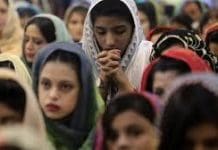 COLOMBO, SRI LANKA (BosNewsLife Columns)– I read regular commentaries on the persecuted church and one in particular has stuck in my mind. It’s a chilling 2013 article in America’s Baptist Press agency titled “Sri Lankan churches attacked, closed.” It detailed an escalating series of attacks on churches by mobs of Buddhist extremists. In many cases local authorities refused help, sometimes even effectively endorsing the violence. Some people had reportedly become afraid of stepping foot in church. Yet, it was something else that caught my attention and has remained in my memory…
COLOMBO, SRI LANKA (BosNewsLife Columns)– I read regular commentaries on the persecuted church and one in particular has stuck in my mind. It’s a chilling 2013 article in America’s Baptist Press agency titled “Sri Lankan churches attacked, closed.” It detailed an escalating series of attacks on churches by mobs of Buddhist extremists. In many cases local authorities refused help, sometimes even effectively endorsing the violence. Some people had reportedly become afraid of stepping foot in church. Yet, it was something else that caught my attention and has remained in my memory…For the article said that the attacks and church closings had not hampered the spread of the Gospel. It quoted a pastor as saying: “God has been preparing us for this persecution all along. He knew!…He opened our minds to a new way of doing ‘church’ last year. Before this even started happening, we were training lay leaders to lead house churches in their homes.”
So as official churches were closing, house churches were starting up, “in someone’s house, a business or even outside under a shade tree.” One pastor said his church had started meeting in 16 different homes and was growing for the first time in years. Another said his church had separated into eight groups, and these were reproducing and starting new churches.
According to the report: “Those who were once afraid to go to a religious place for fear of a mob or the monks asking questions are not concerned about going to a friend’s home.”
In 2013 Sri Lanka gave the impression that it might become a country like Pakistan is today, with a Christian minority living in fear of the increasing aggression of belligerent extremists from the religious majority.
A year later, Sri Lanka was ranked at No. 29 in the annual Open Doors World Watch List of the 50 countries where Christians are most persecuted for their faith. But then in 2015 it fell sharply to No. 44 on the annual list of advocacy group Open Doors. And in the 2016 list, released this January, it has dropped out altogether.
Open Doors commented: “A dictatorial president, Mahina Rajapaksa, was unexpectedly defeated in January [2015] elections after appearing confident of victory. He had close ties to two radical Buddhist movements and, since then, both movements have been quiet.
Churches are still attacked by local communities, but nationally-approved violence seems to be on the decrease, even if it continues to make little difference if Christians complain after an attack.”
I do not know enough about current conditions in Sri Lanka to be able to draw a direct connection between the rise of the house church movement and the decline in persecution. But that pastor’s beautiful comment has remained lodged in my brain: “God has been preparing us for this persecution all along. He knew!”
As we witness the dramatic escalation in the persecution of Christians in so many countries we should heed what has happened in Sri Lanka and we should remember that pastor’s words: “God knows! He is in control.”
That is a message of hope for all Christians.
 (Martin Roth (www.authormartinroth.com), BosNewsLife’s Senior Columnist and Special Correspondent is a respected Australian journalist and former Tokyo-based foreign correspondent. He is the author of “Journey Out Of Nothing: My Buddhist Path to Christianity” and of the Brother Half Angel series of thrillers, which focus on the persecuted church. BosNewsLife Columns distributes opinionated columns and commentaries providing a fresh perspective on issues in the news. They do not necessarily reflect the opinion of BosNewsLife News Agency or its parent company.)
(Martin Roth (www.authormartinroth.com), BosNewsLife’s Senior Columnist and Special Correspondent is a respected Australian journalist and former Tokyo-based foreign correspondent. He is the author of “Journey Out Of Nothing: My Buddhist Path to Christianity” and of the Brother Half Angel series of thrillers, which focus on the persecuted church. BosNewsLife Columns distributes opinionated columns and commentaries providing a fresh perspective on issues in the news. They do not necessarily reflect the opinion of BosNewsLife News Agency or its parent company.)









Dear Sir,
I am sure that all of what you state is correct. However, what you do not state is that it is a “business” to start up churches in Sri Lanka. Any person creates a “Church” and take a “donation” from parishioners. These parishioners are usually poor, uneducated people who are completely subjugated. As with most businesses the churches go bankrupt when the “pastor” gets into debt and looses his “flock”. I have personally witnessed this “business” and am fully familiar with western church sponsorship of “evangelical” churches. This is a poor investment with little to show in improved human behaviour.
The Christian Church in Sri Lanka is unfortunately spreading intolerance and bigotry through their aggressive evangelism in the island. Buying souls for Christ is not Christianity – it is a marketing scheme. Exploiting poverty and ignorance is not the Christian way of gaining converts, but in Sri Lanka there is little to stop unethical pastors from doing as they please.
Mr. Ravi Abay,
I believe the author meant that some local businesses are allowing churches to meet in their buildings, not that people are starting churches to make money.